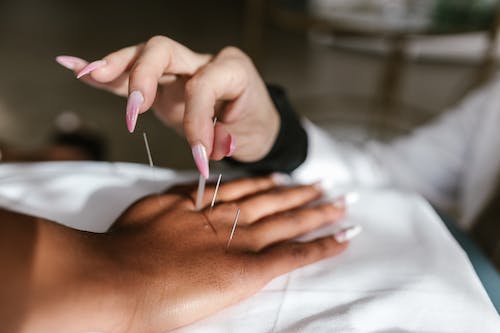High blood pressure, also known as hypertension, is a serious health condition that affects millions of people worldwide. It is a leading cause of heart attacks, strokes, and other cardiovascular diseases. There are various treatment options available for managing high blood pressure, including medication, lifestyle changes, and alternative therapies. In this article, we will explore the benefits of acupuncture for high blood pressure and how it works as a treatment.

What is Acupuncture?
Acupuncture is a form of traditional Chinese medicine that involves inserting thin needles into specific points on the body. The goal of acupuncture is to balance the flow of energy, known as Qi, throughout the body. Traditional Chinese medicine practitioners believe that Qi flows through channels or meridians in the body and that imbalances or blockages in the flow of Qi can cause health problems.
Acupuncture has been used for thousands of years to treat a wide range of health conditions, including general body aches and pain, digestive disorders, respiratory conditions, and emotional disorders. In recent years, acupuncture has gained popularity as a complementary therapy for high blood pressure.

How Does Acupuncture Work for High Blood Pressure?
The exact mechanism by which acupuncture works for high BP is not fully understood. However, research suggests that it may help to reduce blood pressure by:
- Regulating the Autonomic Nervous System
The autonomic nervous system is responsible for controlling involuntary functions in the body, such as blood pressure and heart rate. Studies have shown that acupuncture can regulate the activity of the autonomic nervous system, leading to a decrease in blood pressure.
- Reducing Inflammation
Inflammation is a major contributor to the development of cardiovascular disease. Acupuncture has been shown to reduce inflammation in the body, which may help to lower blood pressure.
- Improving Endothelial Function
The endothelium is a thin layer of cells that lines the blood vessels. Endothelial dysfunction, or damage to the endothelium, is a key factor in the development of cardiovascular disease. Acupuncture has been shown to improve endothelial function, which may help to lower blood pressure.
- Increasing Nitric Oxide Production
Nitric oxide is a molecule that helps to relax and widen blood vessels, which can lower blood pressure. Acupuncture has been shown to increase nitric oxide production in the body.
- Reducing Stress and Anxiety
Stress and anxiety are known to increase blood pressure. Acupuncture has been shown to reduce stress and anxiety levels, which may help to lower blood pressure.
What Does Research Say About Acupuncture and High Blood Pressure?
Research on the effectiveness of acupuncture for high blood pressure is mixed, with some studies suggesting it may be beneficial and others finding no significant effects. Here’s a closer look at what the research says about acupuncture and high blood pressure:
- Acupuncture may lower blood pressure.
Several studies have found that acupuncture may help lower blood pressure in people with hypertension. For example, a 2015 review of 27 studies found that it was associated with significant reductions in both systolic and diastolic blood pressure. Another study published in the Journal of Alternative and Complementary Medicine in 2018 found that it was effective in reducing blood pressure in patients with prehypertension.
- The effects of acupuncture on blood pressure may be temporary.
While some studies have found that acupuncture can lower blood pressure, the effects may not be long-lasting. For example, a 2018 study published in the Journal of Alternative and Complementary Medicine found that while acupuncture was effective in reducing blood pressure, the effects were not sustained beyond a 24-hour period.
- Acupuncture may be effective in combination with other therapies.
Some studies suggest that acupuncture may be more effective when used in combination with other therapies. For example, a 2015 study published in the Journal of Alternative and Complementary Medicine found that acupuncture combined with medication was more effective at reducing blood pressure than medication alone. Similarly, a 2017 study published in the Journal of Clinical Hypertension found that acupuncture combined with lifestyle modifications like diet and exercise was effective at reducing blood pressure in patients with hypertension.
- More research is needed.
Despite some promising findings, more research is needed to determine the effectiveness of acupuncture for high blood pressure. Many studies have been small and of low quality, making it difficult to draw firm conclusions about the therapy’s benefits. Additionally, some studies have found conflicting results, highlighting the need for further research to clarify the therapy’s effects.
In summary, some research suggests that acupuncture may be effective at lowering blood pressure in people with hypertension, particularly when used in combination with other therapies. However, more research is needed to determine the therapy’s long-term effectiveness and to better understand how it may be used to manage high blood pressure. Anyone considering acupuncture as a treatment for hypertension should speak with their healthcare provider to discuss the potential risks and benefits of the therapy.
What to Expect During an Acupuncture Treatment for High Blood Pressure?
During an acupuncture treatment for high blood pressure, you can expect the following:
- Consultation: Your acupuncturist will begin by discussing your medical history and any current medications you are taking. They may also ask about your lifestyle habits and diet.
- Assessment: Your acupuncturist will then assess your pulse and examine your tongue to help identify imbalances in your body’s energy flow.
- Needles insertion: Your acupuncturist will insert very thin, sterile needles into specific points on your body, usually along the arms, legs, and back. The needles may be left in place for 20 to 30 minutes while you relax.
- Other treatments: Your acupuncturist may also recommend other therapies to help support your treatment, such as herbal supplements, dietary changes, or exercise.
- Follow-up: Your acupuncturist will likely schedule follow-up appointments to monitor your progress and adjust your treatment plan as necessary.
It is important to note that acupuncture may not work for everyone, and it is always best to consult with your healthcare provider before starting any new treatment for high blood pressure. Additionally, if you have a fear of needles, it is important to discuss this with your acupuncturist before the treatment begins. They may be able to offer alternative therapies, such as acupressure, that do not involve needles. Electro-acupuncture Treatments For High Blood Pressure.
Infotainia (@infotainia) / Twitter




